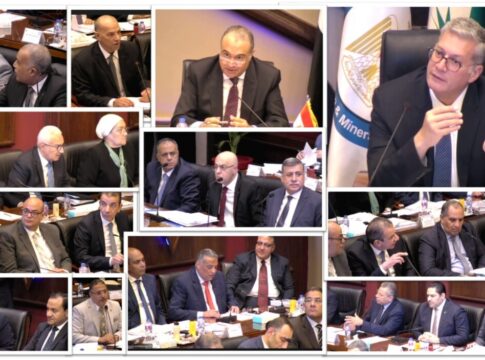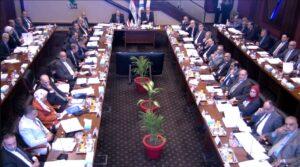Minister of Petroleum and Mineral Resources Eng. Karim Badawi emphasized the critical role of the petrochemical industry sector in the Egyptian economy. He noted that this sector is intricately linked to enhancing local industries and reducing the need for hard currency imports. Additionally, the sector significantly contributes to the daily lives of citizens by providing essential raw materials and products used across various industries.
The emphasis on the importance of the petrochemical industry was highlighted during the General Assembly of the Egyptian Petrochemicals Holding Company. The assembly, chaired by Minister Badawi, took place at the company’s headquarters. It aimed to approve the fiscal year 2023-2024 results and review the progress of numerous new projects undertaken by the holding company to boost petrochemical production and support green production initiatives.
Badawi outlined the ministry’s ongoing efforts to stimulate investment in crude oil and gas production. These efforts aim to optimize the capacities of petrochemical production plants and attract new investments, ultimately increasing economic returns. He also highlighted the need to prioritize occupational safety and health at various petrochemical sites, ensuring continuous improvements to maintain worker safety.
Badawi also stressed the significance of environmental sustainability in the petrochemical industry. He advocated for the industry’s commitment to being environmentally friendly and generating positive environmental outcomes. This pledge includes implementing new petrochemical production projects that will reduce imports and achieve notable environmental benefits over the coming years.
One such upcoming project involves producing wooden panels from rice straw in Edco City. This project, currently in the experimental phase, is set to commence commercial operations this year, aiming to produce 205,000 cubic meters of wood panels for the furniture and flooring industries. This project will economically benefit from rice straw and mitigate environmental damage from its disposal.
Other important projects include the production of methanol derivatives in Damietta, designed to yield 140,000 tons of derivatives for adhesives, ready-mix concrete, and fertilizers. Additionally, a bioethanol production initiative in Damietta will generate 100,000 tons of bioethanol, which can be used in pharmaceuticals and inks and added to car gasoline to reduce carbon emissions.
Badawi also plans a soda ash production project to replace a product Egypt imports for no less than $250 million annually. This product is essential for glass, paper, chemical, and detergent manufacturing. Furthermore, a silicon complex project will produce 45,000 tons of mineral silicon from Egyptian quartz ore, maximizing the added value of the raw material.
Badawi emphasized the importance of expanding energy efficiency programs within the petrochemical industry. These programs aim to conserve and save energy, setting an example for other sectors. By focusing on safety, environmental sustainability, and energy efficiency, the sector can attract new investments and optimally utilize production capacities.
Badawi also highlighted the importance of investing in human resources, supporting innovation, and adopting new ideas and technologies. These investments will help the petrochemical industry achieve significant advancements in the coming years. Minister Badawi praised the initiative to involve youth from the Young and Medium Leaders Program in the general assemblies of companies to facilitate the transfer and sharing of expertise.
Eng. Ibrahim Mekki, Chairman of the Egyptian Petrochemicals Holding Company, reviewed the business results during the assembly. He reported that the total production of petrochemical factories and companies, which includes nine existing and producing companies, reached approximately 4 million tons during the 2023-2024 fiscal year. The production plan was achieved by 105%, with total sales of petrochemical products amounting to approximately 37 billion pounds for the local market and exports.
Mekki also reviewed efforts to implement new projects and their economic and environmental impacts. Nine projects are in various implementation stages, planned to produce approximately 6 million tons. Highlights include the medium-density wood panels project in Edco City and the methanol derivatives project in Damietta.
Additionally, Mekki emphasized the achievements in occupational safety and health. He noted that 27 million working hours were accomplished while maintaining high safety and health standards for workers. The Chairman also highlighted efforts in supporting energy efficiency within the petrochemical sector.
Overall, Minister Badawi’s leadership and strategic initiatives in the petrochemical sector are set to drive substantial economic and environmental benefits. These efforts position Egypt as a leader in sustainable and efficient industrial production, paving the way for a promising future in the petrochemical industry.



